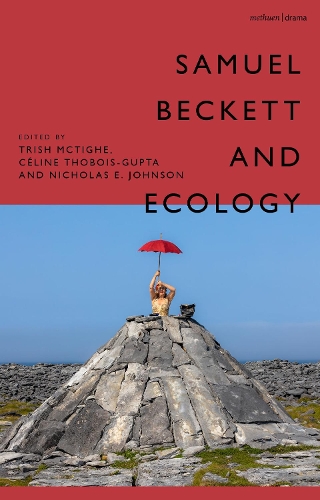
Samuel Beckett and Ecology
(Hardback)
Publishing Details
Samuel Beckett and Ecology
By (Author) Trish McTighe
Edited by Cline Thobois-Gupta
Edited by Nicholas E. Johnson
Bloomsbury Publishing PLC
Methuen Drama
29th May 2025
United Kingdom
Classifications
Professional and Scholarly
Non Fiction
Literary studies: plays and playwrights
828.91409
Physical Properties
Hardback
264
Width 146mm, Height 216mm, Spine 20mm
460g
Description
This is the first full-length book to investigate Becketts work through contemporary ecological thinking, offering a wide range of artistic and scholarly responses to ongoing ecological crises. In response to the ever-growing urgency of global warming, the vitality and the creativity of art and literature have been singled out as sources of hope by Nobel Prize awardee in chemistry and coiner of the Anthropocene, Paul J. Crutzen. Samuel Beckett was not an environmental artist, but his oeuvre, poised between forms of precarity and hope, is a rich territory for the exploration of the most pressing issues of our time: the rift between the human species, its technological and economic advancement and the ecologies that sustain it all. In recent years, Becketts name, aphorisms and work have frequently been invoked relative to environmental catastrophe, helping stimulate debates on ecology, the arts and the eco-systemic place of the human. Beckett and Ecology is the first full-length book to offer a wide range of scholarly and artistic responses to the ecological crises provoked, mediated or challenged by Becketts work. The volume reflects on the varied practices and narratives in Beckettian intermedial ecologies, offering new insights into the connections between Beckett and the Anthropocene in the terrains of translation, adaptation, performance and the visual arts. Chapters also explore the potential of Happy Days (1961) for ecological thought and the role it has taken in ecodramaturgy. Short bursts of writing, entitled Coups de gong, are woven throughout the volume and testify to the variety of Beckett-inspired local responses to global climate instability.
Reviews
This volume is transformational in Beckett studies in its range of global contributors and in the dialogues it sets up between scholars, artists and activists. The book is an important and compelling addition to Beckett studies, theatre studies and ecocriticism. * Anna McMullan, University of Reading, UK *
Author Bio
Trish McTighe is Lecturer in Drama at Queens University Belfast, UK. Cline Thobois-Gupta is an IRC-funded PhD researcher in the Department of Drama at Trinity College Dublin, Ireland, and an ECR Fellow at the Trinity Long Room Hub. Nicholas E. Johnson is Associate Professor of Drama at Trinity College Dublin, Ireland, where he directs the Trinity Centre for Beckett Studies.
